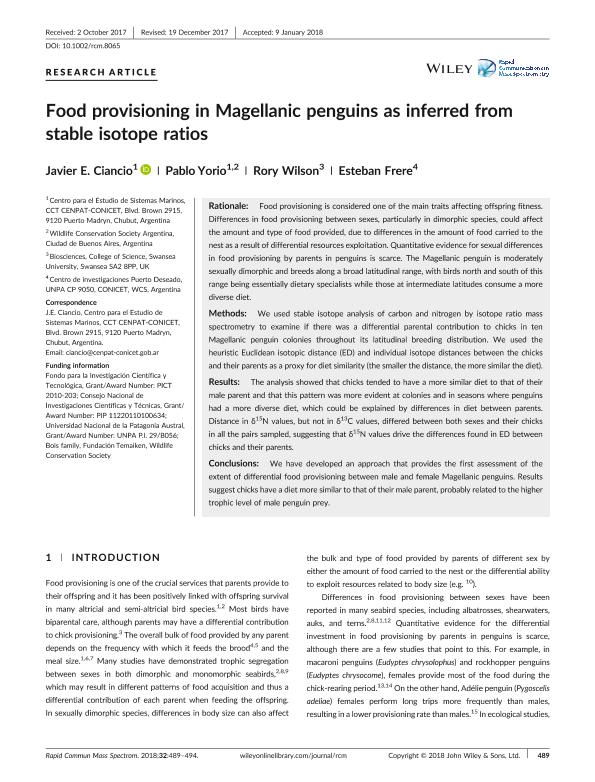Mostrar el registro sencillo del ítem
dc.contributor.author
Ciancio Blanc, Javier Ernesto

dc.contributor.author
Yorio, Pablo Martin

dc.contributor.author
Wilson, Rory P.

dc.contributor.author
Frere, Esteban

dc.date.available
2019-11-13T19:34:29Z
dc.date.issued
2018-03
dc.identifier.citation
Ciancio Blanc, Javier Ernesto; Yorio, Pablo Martin; Wilson, Rory P.; Frere, Esteban; Food provisioning in magellanic penguins as inferred from stable isotope ratios; John Wiley & Sons Ltd; Rapid Communications in Mass Spectrometry ; 32; 6; 3-2018; 489-494
dc.identifier.issn
0951-4198
dc.identifier.uri
http://hdl.handle.net/11336/88767
dc.description.abstract
Rationale: Food provisioning is considered one of the main traits affecting offspring fitness. Differences in food provisioning between sexes, particularly in dimorphic species, could affect the amount and type of food provided, due to differences in the amount of food carried to the nest as a result of differential resources exploitation. Quantitative evidence for sexual differences in food provisioning by parents in penguins is scarce. The Magellanic penguin is moderately sexually dimorphic and breeds along a broad latitudinal range, with birds north and south of this range being essentially dietary specialists while those at intermediate latitudes consume a more diverse diet. Methods: We used stable isotope analysis of carbon and nitrogen by isotope ratio mass spectrometry to examine if there was a differential parental contribution to chicks in ten Magellanic penguin colonies throughout its latitudinal breeding distribution. We used the heuristic Euclidean isotopic distance (ED) and individual isotope distances between the chicks and their parents as a proxy for diet similarity (the smaller the distance, the more similar the diet). Results: The analysis showed that chicks tended to have a more similar diet to that of their male parent and that this pattern was more evident at colonies and in seasons where penguins had a more diverse diet, which could be explained by differences in diet between parents. Distance in δ15N values, but not in δ13C values, differed between both sexes and their chicks in all the pairs sampled, suggesting that δ15N values drive the differences found in ED between chicks and their parents. Conclusions: We have developed an approach that provides the first assessment of the extent of differential food provisioning between male and female Magellanic penguins. Results suggest chicks have a diet more similar to that of their male parent, probably related to the higher trophic level of male penguin prey.
dc.format
application/pdf
dc.language.iso
eng
dc.publisher
John Wiley & Sons Ltd

dc.rights
info:eu-repo/semantics/openAccess
dc.rights.uri
https://creativecommons.org/licenses/by-nc-sa/2.5/ar/
dc.subject
Food provisioning
dc.subject
Magellanic penguin
dc.subject
Stable isotope ratios
dc.subject.classification
Ecología

dc.subject.classification
Ciencias Biológicas

dc.subject.classification
CIENCIAS NATURALES Y EXACTAS

dc.title
Food provisioning in magellanic penguins as inferred from stable isotope ratios
dc.type
info:eu-repo/semantics/article
dc.type
info:ar-repo/semantics/artículo
dc.type
info:eu-repo/semantics/publishedVersion
dc.date.updated
2019-10-22T15:53:23Z
dc.journal.volume
32
dc.journal.number
6
dc.journal.pagination
489-494
dc.journal.pais
Reino Unido

dc.journal.ciudad
Londres
dc.description.fil
Fil: Ciancio Blanc, Javier Ernesto. Consejo Nacional de Investigaciones Científicas y Técnicas. Centro Científico Tecnológico Conicet - Centro Nacional Patagónico. Centro para el Estudio de Sistemas Marinos; Argentina
dc.description.fil
Fil: Yorio, Pablo Martin. Consejo Nacional de Investigaciones Científicas y Técnicas. Centro Científico Tecnológico Conicet - Centro Nacional Patagónico. Centro para el Estudio de Sistemas Marinos; Argentina. Wildlife Conservation Society Argentina; Argentina
dc.description.fil
Fil: Wilson, Rory P.. Swansea University; Reino Unido
dc.description.fil
Fil: Frere, Esteban. Universidad Nacional de la Patagonia Austral. Unidad Académica Caleta Olivia. Centro de Investigaciones Puerto Deseado; Argentina
dc.journal.title
Rapid Communications in Mass Spectrometry

dc.relation.alternativeid
info:eu-repo/semantics/altIdentifier/doi/https://doi.org/10.1002/rcm.8065
dc.relation.alternativeid
info:eu-repo/semantics/altIdentifier/url/https://onlinelibrary.wiley.com/doi/abs/10.1002/rcm.8065
Archivos asociados
